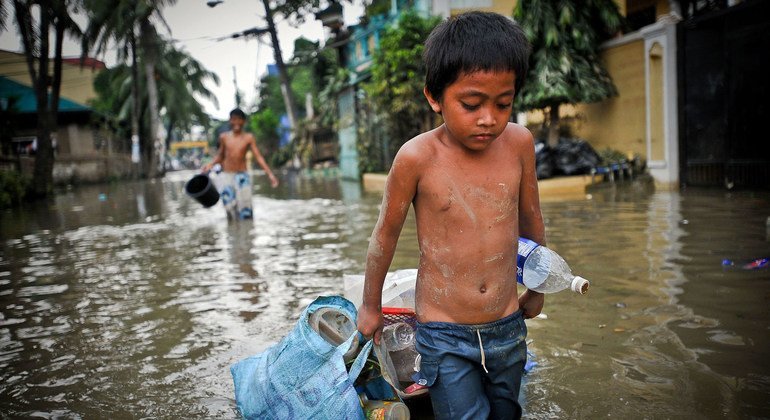Typhoons Kristine and Leon wreak havoc in the Philippines, leaving thousands of families and children in dire need of safe water and sanitation facilities. The devastating impact of these two tropical cyclones, the 11th and 12th to hit the country this year, has affected at least 4.2 million individuals, with approximately 1.3 million of them being children. Over 300,000 people have been displaced, adding to the already dire situation in the country.
The recent typhoons have worsened the existing water and sanitation crisis in the Philippines, where access to these essential services was already limited. In some communities, open defecation has been reported as facilities have been washed away, raising concerns about potential disease outbreaks.
UNICEF Representative to the Philippines, Oyunsaikhan Dendevnorov, emphasized the critical need for lifesaving supplies during and after emergencies. UNICEF, in collaboration with partners, has been working tirelessly to provide water, sanitation, and hygiene supplies to affected families and children to prevent the spread of diseases. Since October 31, UNICEF and its partners have distributed 2,950 hygiene and water kits to families in the hardest-hit provinces of Camarines Sur and Albay in the Bicol Region, with an additional 350 kits set to be delivered in the coming days through partnerships with Action Against Hunger and Plan International Pilipinas.
The education sector has also been severely impacted by the recent typhoons, with the Department of Education estimating that at least 500 schools in the Bicol Region require urgent assistance. This has disrupted learning for 20 million children nationwide. UNICEF is urging that schools remain dedicated to education and not be used as evacuation centers to ensure that children have a stable learning environment. The organization is set to provide educational supplies to 14,594 learners and 765 teachers in 25 schools and five Community Development Centers in collaboration with local education authorities.
The Philippines, already known as Southeast Asia’s most disaster-prone country, is facing increasingly frequent and severe weather events due to climate change. With storms Marce and Nika impacting many of the same regions last weekend and a new weather system forming that could become Tropical Storm Ofel, recovery efforts are under immense strain. Despite these challenges, the government has intensified its response, while UNICEF and its partners continue to support communities with critical resources and interventions.
UN Resident Coordinator in the Philippines, Gustavo González, highlighted the growing risk posed by natural hazards in a blog on UN News, emphasizing the exposure to disasters and vulnerability to climate change that have compelled action. The need for resilience-building measures and sustainable development practices is more urgent than ever in the face of such recurring disasters.
In the midst of the devastation caused by Typhoons Kristine and Leon, the resilience and unity of the Filipino people shine through. Communities come together to support each other, aid organizations work tirelessly to provide assistance, and the government ramps up its response to ensure the well-being of its citizens. The road to recovery may be long and challenging, but with the collective efforts of all stakeholders, the Philippines will rebuild stronger and more resilient than ever before.









